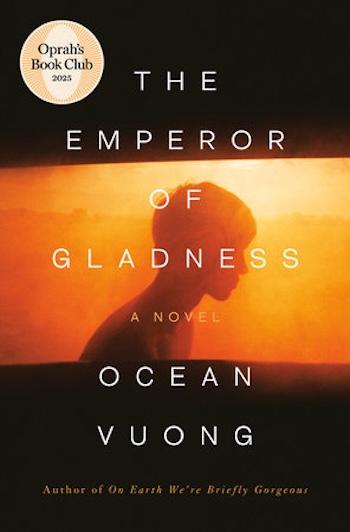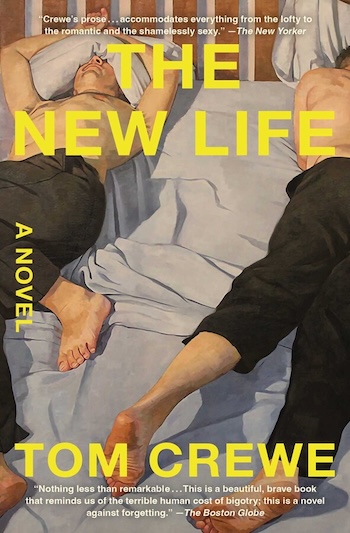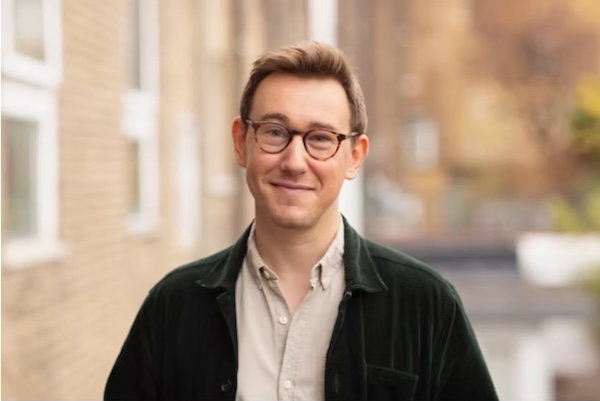By Roberta Silman
To be silent in the face of cruelty is to be complicit. And I refuse to be complicit. Surely we have to recognize that there are differences in taste. But to skewer another writer with such precision and glee? That is beyond the pale, especially in these perilous times.
The Emperor of Gladness by Ocean Vuong. Penguin Press, 402 pages, $30 and The New Life by Tom Crewe. Scribner, 391 pages, paperback, $18
 The summer began when a friend brought me a copy of The Emperor of Gladness by the acclaimed American writer Ocean Vuong, whose poetry and 2019 epistolary novel On Earth We’re Briefly Gorgeous have caught the attention of many readers, especially the young. He was born in Vietnam and came with his mother to Hartford when he was two. Their life was a hardscrabble one — she worked in a nail salon and was virtually illiterate, and he was dyslexic in school and struggled with his sexual identity until he came out as gay. But he began writing poems, started at community college, then found his way to Brooklyn College, where he came under the tutelage of Ben Lerner. He graduated and went to NYU, where he received his MFA.
The summer began when a friend brought me a copy of The Emperor of Gladness by the acclaimed American writer Ocean Vuong, whose poetry and 2019 epistolary novel On Earth We’re Briefly Gorgeous have caught the attention of many readers, especially the young. He was born in Vietnam and came with his mother to Hartford when he was two. Their life was a hardscrabble one — she worked in a nail salon and was virtually illiterate, and he was dyslexic in school and struggled with his sexual identity until he came out as gay. But he began writing poems, started at community college, then found his way to Brooklyn College, where he came under the tutelage of Ben Lerner. He graduated and went to NYU, where he received his MFA.
After publishing both poems and his first novel, Vuong began teaching at the University of Massachusetts and is now on the faculty of the MFA program at NYU. His work has been on Oprah’s radar. On Earth We’re Briefly Gorgeous sold an estimated one to four million copies, and he has been awarded a prestigious MacArthur Fellowship as well as several other prizes.
I began to read The Emperor of Gladness and also gave a copy to one grandson, who had just finished his junior year at college and loves fantasy and science fiction. At first, I found myself unsettled by the way the narrative swooped from the present to the past, from reality to dreams and nightmares, from the small fictional town of Gladness, Connecticut, to Vietnam and Lithuania. After about a third of the way through, I wrote to my editor that I wasn’t sure I could review this novel because so far it seemed like “a mess.”
Then my copy of The London Review of Books arrived, and in it was a review by Tom Crewe that skewered both The Emperor of Gladness and On Earth We’re Briefly Gorgeous. I sent the Crewe critique to my grandson, perhaps as a warning that he might not like Emperor. To my surprise, he replied that he had already read the novel and wrote: “I actually loved Ocean Vuong’s prose. Yes, it’s meandering and flowery, but he’s a poet at heart and so I tried to let the verse just sweep me away and take me somewhere new.” That made me sit up straighter; right then I knew I had to finish Emperor.
Although I am not a fan of reviewers who write brutal reviews, it seemed only fair to read Crewe’s The New Life, which had been published in 2024 to good reviews. Perhaps, I thought, this would help answer a question: Why would an English writer who is 36, gay, and has a promising career — not only as a novelist but as a critic and editor at The London Review of Books — choose to write such an awful, mean-spirited review of his contemporary in America, a now-famous, also gay writer of 37? And what does this whole affair say about what is happening to all of us, not only to those in the small literary world these men and I inhabit?
Something seemed rotten in Denmark. It was time to finish both books. So here are my impressions.
The Emperor of Gladness begins with a description of the small Connecticut town where Hai is standing on a bridge, with every intention of jumping, but is talked out of it by an old woman named Grazina who lives in a ramshackle house near the river. When he comes down, we learn that he is nineteen years old and the child of a Vietnamese single mother. He is depressed and lost and has nowhere to go because he has told his mother that he is attending medical school at Harvard. So he moves in with Grazina. They form a bond, and after a time Hai gets a job at a fast food restaurant where his cousin Sony, a Civil War buff, also works; there they meet a quirky bunch of characters who will, along with Grazina, become his newfound family. His mother still lives in Hartford, works at a nail salon, and, when they talk on the phone occasionally, it is clear that she believes his lie. Although he is able to hold down a job, he still takes drugs and lives mostly in his head. So does Grazina.

Poet and novelist Ocean Vuong. Photo: Peter Bienkowski
Thus, this novel is filled with fantasies from the past, memories — often traumatic — that appear with no warning, as well as hopes for the future. The story also provides a primer on America’s fast-food business, including how food is lugged into warehouses and then moved from warehouses to restaurants. There are also memories of a trip to the Stonewall Jackson house with his mother and grandmother, and Sony and Sony’s mother Aunt Kim, who is now in jail. In addition, there are a few zany trips with his equally zany friends from work, culminating in a trip to Vermont to find the place where Sony’s father died. When it turns out that some of Grazina’s fantasies are real — she does have a son nearby who wants her to go into assisted living — the book ends. But over the course of the narrative, Hai has grown and gained a better understanding of himself and how to live “his one wild and precious life.” Here is Hai describing the folks from work comforting Sony when he finds the remains of his father’s car accident:
Hai could tell, from the faint throb in Sony’s neck, that the boy was trying hard to hold it in. BJ’s shadow slid across the dried leaves and covered Sony like a cape. She cupped the boy’s head with her hand, as if to hold him in place, before reaching down to hug him. He turned into her embrace as Maureen took the headrest into her arms, bouncing it like a living baby. Hai came forward, his mouth partly open, and threw his arms around the huddled group, his face buried in BJ’s enormous back as the branches clicked above them in the spring gale. These people, bound by nothing but toil in a tiny kitchen that was never truly a kitchen, paid just above minimum wage, their presence known to each other mostly through muscle memory, the shape of their bodies ingrained in the psyche from hours of periphery maneuvering though the narrow counters and back rooms of a fast-food joint designed by a corporate architect, so that they would come to know the sound of each other’s coughs and exhales better than those of their kin and loved ones, They, who owe each other nothing but time, the hours collectively shouldered into a shift so that they might finish on time, now brought to their knees in a forest to gather around a half-burnt headrest of a Nissan Maxima on a Tuesday in mid-April, their bodies finally touching, a mass of labor cobbled together by a boy’s hallowed loss . . . .
 The Emperor of Gladness is about people discovering connections, forming families, and building relationships that nurture them and enhance their self-esteem in a society that sees them as having little or no value. It is about how it feels to make your way — starting with nothing— in a crazily complicated country where race and gender play outsized parts. And it provides a powerful tableau of those who live on the fringes, who may be flawed and seduced by drugs and drink, yet whose innate kindness and decency “gets into our bones.” As we root for these lost souls to find their way, they become unforgettable, and we become infused with the hope they need so desperately in order to survive.
The Emperor of Gladness is about people discovering connections, forming families, and building relationships that nurture them and enhance their self-esteem in a society that sees them as having little or no value. It is about how it feels to make your way — starting with nothing— in a crazily complicated country where race and gender play outsized parts. And it provides a powerful tableau of those who live on the fringes, who may be flawed and seduced by drugs and drink, yet whose innate kindness and decency “gets into our bones.” As we root for these lost souls to find their way, they become unforgettable, and we become infused with the hope they need so desperately in order to survive.
This novel is more than a portrait of an America in which economic inequities have blinded us to the needs of our fellow men: Vuong pricks our conscience in much the same way that Theodore Dreiser did a century ago. His language is sometimes hard to comprehend, but that difficulty only reinforces the surreal absurdities that abound in the world he has created. So, in the end, I found The Emperor of Gladness more exhilarating than puzzling, and was glad I had not only read it but also shared it with my grandson.
Tom Crewe’s The New Life is a completely different kind of novel. Set in the late 1890s in London, it explores English attitudes towards homosexuality, culminating in the trial of Oscar Wilde in 1896. Based on the real John Addington Symonds and Havelock Ellis, the book’s protagonists, John Addington and Henry Ellis, are upper class Englishmen intellectuals who are in strange marriages to women but whose real lives lie in their “inversion.” In fact, they are actually writing a book together called Sexual Inversion, and the progress of their project defines the trajectory of the story. There is a lot of fog in this book — perhaps a metaphor for the stupidity and intolerance of the English public — and also many descriptions of male sexual desire, a la Alan Hollinghurst — both rendered to the point of tediousness. One of the mysteries of sex is just that: it is a mystery, and so many efforts to describe its rapture can become boring. For me, the novel most resembles something by E.M. Forster or Ford Madox Ford. So we have a perfectly readable old-fashioned book, written in respectable prose by a historian who is also portraying people on the fringes.
The problem, though, is that in Crewe’s novel there is no one to root for. John Addington is a repulsive man who has finally, after many years of marriage, brought his lover into the familial home. Ellis, who has failed to consummate his marriage, is confused and frustrated because his sexual proclivities lean towards the absurd. He and Edith marry, but he lives apart, she shares most of her life with a woman friend, Angelica. Throughout the narrative, Edith never fails to remind Henry that there are women who are experiencing “inversion.” I waited for this to culminate in an important plot point focusing on Edith, but it never came. Moreover, the Wilde trial foreshadowed, and is, in its way, a thematic lynchpin. Yet not much is made of it — to my disappointment. The book ends with the trial of the bookseller, who insists on retailing Sexual Inversion. Neither Addington nor Ellis is given an ounce of nobility — they are exposed as the cowards they are. In the end, Addington’s wife and daughters leave John, and Henry goes back to his hapless life while there is a hint that Edith and Angelica may have a reasonable future. So this ends as a novel about brokenness, connections fraying until they snap, and few hopes or dreams. Neither John nor Henry grows much, and what the reader is left with is their bitterness and resentment at the way they are wired. Here is John describing his life to a friend:
. . . I am a married man only because I was told to be. I have tried to be a husband; I suppose I am not a bad one. I love my wife and my children. But Catherine is not happy. Neither of us has ever been. I have been disnatured. It is as simple and as terrible as that. No man should live his whole life in opposition to his nature—not when that nature is hymned by Plato. I will not suffer any longer, I have decided.
And here is Henry, later on in the book, musing on his predicament:
So he went on working, This way he could feel himself secure, feel his grip on something firm and real. His intelligence, when he focused it, felt hard, sharp—-like a cutting tool. The subject—-inversion——was beginning to shape itself under the scalpel of his attention. He could almost see it whole, finished, shaped, a compact argument, faultless in every line. He anticipated its entrance into the world, saw himself as a public man, carried over the chasm of his shyness by a new, fulfilling strength, complete conviction, the great moral advance for which he and Addington formed the vanguard.
It was only when he lost his focus . . . that work, the subject of the book, became another source of fear. His thoughts traveled to locked rooms, to underground lavatories, to passageways, to fumbling and flickering in the dark. There was so much loneliness and anger and lust, seething and boiling under this inadequate covering of words. He felt its furious pressure, under the surface of life.
The tent of English literature is very wide, encompassing all kinds of interesting experiments — from James Fenimore Cooper to James Baldwin, from Chaucer to Laurence Sterne to James Joyce. From Jane Austen and Barbara Pym to Emily Brontë and Virginia Woolf and Harriette Simpson Arnow. So my question is: Why attack Vuong so viciously? If you go online, you will find that a man in Yorkshire wrote: “Tom Crewe’s vivisection of the works of Ocean Vuong is surely one of the best things of its kind since Macaulay’s demolition of Robert Montgomery’s poetry in the Edinburgh Review of April 1830.” (LRB, 26 June). But why would someone, almost two hundred years later, need to do this? Fame? Celebrity? Jealousy? Or maybe just to get a little publicity for his book which has just been released in paperback? I have no idea.

Novelist and critic Tom Crewe. Photo: courtesy of the artist
But I do not respect it. And I know that most reviewers in their right minds who find themselves, “writhing, and groaning,” as Crewe claims he did while reading Emperor, would simply take a pass, put the book aside, and not review it. So why did Crewe persist, and why did his editors foster his folly? Why didn’t Jean McNicol and Alice Spawls, who are the editors of LRB simply say, “Are you sure you want to do this, Tom?” Why didn’t all the people who had anything to do with Crewe’s review think about what they were doing, and perhaps advise Crewe to temper his remarks? I honestly can’t imagine, but my guess is that even our small literary corner of the world has been affected by the culture of spitefulness we now find ourselves living in. Viciousness and brutality are the name of the game — one has only to look at the front page of the daily newspaper to know that. But, instead of succumbing to the ubiquitous culture of hatefulness, should we not be fighting its effects wherever we can? Should we not choose compassion?
As many of you know, Grace Paley was my teacher and friend. I recall an evening at her home when her close friend Don Barthelme began talking about reviewing, and he said, basically, “I don’t think we should be reviewing books at all. We should be marking a book’s publication and giving some basic information about the setting, characters, and plot. But our basic job should be to encourage the writer’s talent, recognizing the simple fact that writing a book is devilishly hard.” I have never forgotten that “devilishly hard.” Don never wrote reviews, and Grace was wiped out after finishing the only one she ever wrote for The New York Times, a review of The Woman Warrior by Maxine Hong Kingston. “This is idiocy,” she told me. “To try to convey the magic of that book is impossible.”
I have spent the last fifteen years as a critic at Arts Fuse trying to “convey the magic” in books I receive and love, but I certainly understand what Grace was talking about. However, my decision to write book reviews comes from my impulse to share good writing with as many people out there who are still interested in English prose. To see Crewe participate in such an act of “vivisection” pained me so much that I cannot be silent.
To be silent in the face of cruelty is to be complicit. And I refuse to be complicit. Surely we have to recognize that there are differences in taste. But to skewer another writer with such precision and glee? That is beyond the pale, especially in these perilous times.
I have always felt that fiction is the history of the world. That is why it is so important to me. Both Vuong and Crewe are adding to that history. So, as we spread the word about new books, let us summon as much generosity of spirit as we can. Let us embrace fairness and inclusion instead of descending into bitter snarkiness. Perhaps Crewe and his accomplices at The London Review of Books should take some time to re-read that great novel Middlemarch by George Eliot, whose breadth and vision and empathy for her characters can serve as a good guide for a decent life. And they should stop and reflect when they get to perhaps my favorite sentence in all of English literature, in Chapter 72, when Dorothea asks: “What do we live for, if it is not to make life less difficult to each other?”
Roberta Silman is the author of five novels, two short story collections, and two children’s books. Her second collection of stories, called Heart-work, was just published. Her most recent novels, Secrets and Shadows and Summer Lightning, are available on Amazon in paperback and ebook and as audio books from Alison Larkin Presents. Secrets and Shadows (Arts Fuse review) is in its second printing and was chosen as one of the best Indie Books of 2018 by Kirkus. A recipient of Fellowships from the Guggenheim Foundation and the National Endowment for the Arts, she has reviewed for The New York Times and Boston Globe, and writes regularly for The Arts Fuse. More about her can be found at robertasilman.com, and she can also be reached at rsilman@verizon.net.
